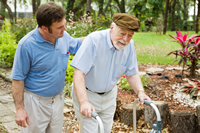Attention A T users. To access the menus on this page please perform the following steps.
1. Please switch auto forms mode to off.
2. Hit enter to expand a main menu option (Health, Benefits, etc).
3. To enter and activate the submenu links, hit the down arrow.
You will now be able to tab or arrow up or down through the submenu options to access/activate the submenu links.
Locator
Contact
Search
Advice from Caregivers Who've Been There

Remember, you aren't alone 
“Realize, okay this is what I have ahead of me, try not to stress out about it. You know, there are options for help if you need it.”
"You know, you have to have the ability to reach out to others for help."
“Reach out to somebody if you need someone to talk to and bounce ideas off of."
“If you feel like you can’t get the message across to your loved one, then maybe have someone else deliver it.”
Getting Help from Family and Friends
Importance of being informed
"Know what to do if a person is having a stroke, know the signs of FAST. "
"I think it’s mostly because of the information that I gathered and the positive mind frame that I was able to keep going."
“Read everything... take advantage, and read all the resources.”
"The more information you have as a caregiver I think the better you feel you are helping.”
"I think most people aren’t aware of the effects of, you know, having to deal with somebody who’s had a stroke. I’d recommended just simply because of the amount of information that’s available. With information comes power and, you know, if you have no information then you are overwhelmed, you don’t know what to do, you can feel hopeless, and stressed about it. With information, at least you know, okay here is what I have to do for this or here are the options that I can choose from to deal with, you know, A B or C…”
“Implement whatever is appropriate for your particular situation. take advantage, full advantage of what is being offered. particularly with, you know, the resources that are available that maybe you might not have known they were there and easily accessible to Veterans. ”
About Stroke
Finding Reliable Health Information
Be Creative
“I bought a hand-gripper thing that he could do work on. I developed some exercises with elastic bands for his hand. You know, I knew what they were wanting to do with him, but he wouldn’t do. Then I got puzzles, we’ve always enjoyed puzzles, but I ended up setting one up. You know, any time he finished a puzzle and we would do it together, I let him do 90 percent of it. And you know the puzzles- you know, picking up the pieces and focusing and concentrating on putting them in place, it was just something that I knew was necessary to do if you do the puzzles, so I thought well, that will make his fingers work, and his gripping um work better. And you know he’s come a long way.”“So, you gotta find something that used to make your heart burn. For example I said “you didn’t wash out of pilot training, are you going to wash out here?”
Be encouraging and understanding
“If you want patient to succeed you have to help make that happen.”“Really know the person that you’re caregiving for. Understanding the strengths and weaknesses, likes and dislikes, are going to make all the difference in the world, to a um successful relationship with a patient and the caregiver.”
Stay hopeful, positive, and remember to laugh
“You really have to stay positive during the whole time frame otherwise, like because if you’re grumpy, you’re pissy, it’s just you’re not going to provide the level of care that is you know needed or would. I mean the old man hasn’t had any unexpected visits to the ER or doctors or anything like that. And I think it’s mostly because of the information that I gathered and the positive mind frame that I was able to keep through it.” “You have to laugh at the situation and realize, this is only temporary. Keep your humor. If you can’t laugh at the situation, they crowd in on ya. They’ll drag you down, if you can’t find the humor in the situation.”
“That’s what’s helped me the most is knowing how to keep my humor."
“Don't lose hope.”
“Things are going to be temporary, there is an end to this. Saying "It’s going to be better," it gives you hope.”
Be patient with yourself and your stroke survivor
“Um be patient, yeah patience is a huge one. Patient with the caregiving. And patient with the uh, you know, whatever loved one you are taking care of.”“I would say patience is super important...both with the person affected and with yourself, and how you may be affected.”
"Taking time away for yourself…just to kind of, you know, realize, okay this is what I have ahead of me, try not to stress out about it."
Take care of yourself. Find time for yourself.
"Take time for yourself.”“Remember to take care of yourself and get some me-time. It's so important.”
“Certainly, you know, taking time away for yourself…just to kind of, you know, realize, okay this is what I have ahead of me, try not to stress out about it.”
“Our health is just as important as the person you’re giving to.”



















